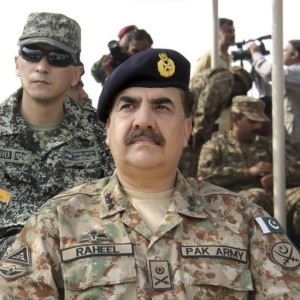Why Did Gen Raheel Sharif Say What He Did?
A few days ago when Gen Raheel Sharif urged Nawaz Sharif to do his utmost to resolve his differences with the marchers politically, as soon as possible,and to do so without resort to violence, what was his motivation in doing so?
And why did this result in whispers of suppressed rage among Nawaz Sharif”s most vocal ministers, and why did they feel the need to hint that their democratic halos had been punctured by the the General’s suggestions?
The motivation of the one and the reaction of the other are not too difficult to guess.
Gen Raheel seemed to have a number of things on his mind for rendering the advice which he did. The most obvious of his reasons must be that his army is currently engaged in operations at one side, while signs were that the LOC and the eastern border was likely to erupt into action as well. In such a situation, no general would like to see a third front opened, pitching the army against its own people in the capital.
But there was more to it than this. The government had invoked Sec 245 and asked the army to stand guard at certain buildings in the capital. The General, any general for that matter, would not countenance the possibility of his troops being sucked into a fray with civilians with a chance that violence may have to be resorted to.
But Gen Raheel would also be more than conscious of a feeling of great resentment which his junior officers and troops harbour against this government–a feeling seldom spoken about but generally very well known in the army. This feeling just did not materialize out of thin air, but was the result of the studied stupidity of this government which seems to have become a part of its DNA.– a run-wild hubris which is difficult to escape.
This resentment started with TV channels’ unending castigation of Musharraf, which soon started being conflated with the army as a whole. These daily rounds of gratuitous pummeling by various government ministers on nearly all TV channels could not have been expected to endear this government to the junior ranks. When Gen Raheel was confronted by such misgivings among junior officers while addressing the SSG, he sought to reassure them, as any general worth his salt would be expected to. The next day when the ISPR issued a gist of the General’s talk to the troops, the vanguard of the Nawaz Sharif’s party promptly went berserk and openly started to condemn these remarks as a challenge to “democracy.” And with the GEO incident this resentment quickly graduated to loathing.
With such feelings entertained by the troops it was doubly essential to emphasize a non-violent approach by the government towards the protesters. Had the troops been ordered to assert crowd control on the protesters, a refusal by the troops to do so would have been a recipe for disaster. That the feeling of resentment was mutual was put beyond doubt a few days later when PML MNAs, passing troops on duty at the parliament house,could not resist passing snide remarks against them. This was MNAs against troops–an adequate commentary on the dignity of the legislators.
Thus it is not difficult to determine why Gen Raheel had given the suggestions to the government which he did. But why should members of the government have been so enraged by this? Why did they have to feel that this was an assault on their democratic privilege, which they are so sensitive about at chosen moments of exhibition, as if their modesty were under threat of violation?
This was a plain case of hubris. It was a rehash of their times in office earlier, when the same overweening pride led them to needlessly butt heads with their army. Only this time it was pride mixed with defensiveness, a guilt reflex, because they knew that it was they who had used sneer and insult to push and prod the army into raising its hackles, and done so quite needlessly. They also knew that the army had challenged their authority to launch the operation in N. Waziristan, despite their wishes to the contrary. Their pride would not allow them to admit that this was in pursuance of national interest, the importance and significance of which had continued to evade them despite the continual mayhem being wreaked on the country by the militants. This was without doubt cause for additional grievance of a government which felt itself belittled.
To top it all, rumours were recently let afloat that the government will drive a resolution through the joint houses of parliament to demand the resignations of D.G ISI and the Army Chief. These rumours could not have come from nowhere. Nawaz Sharif has gone that route once, and no matter how Achackzai, Mulla Fazal, and some others may lean upon his vanity and drive him, it would be better for him, to leave the repeat of this manoeuvre to the next generation. At the very least he should remind himself that the army and its Chief enjoy an approval rating of 87 %, and that is a trifle more than the membership of the two houses of parliament and even throw the White House’s statements in the balance. Pride is best swallowed before it crosses into the realm of stubbornness because then it changes its nomenclature.




